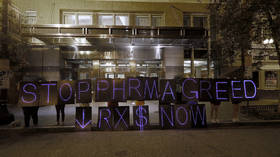Big Pharma jacked up drug prices over 1,000 times this year – research

The US pharmaceutical industry has raised drug prices some 1,186 times this year, according to Patients for Affordable Drugs, an advocacy group seeking to rein in the sky-high cost of prescription drugs. The group published their analysis on Wednesday.
Despite record profits, pharmaceutical companies jacked up the prices on 133 products between June 24 and July 5 alone, the group found, noting that the median price increase for 2022 was 5%. In July alone, 64 drug companies hiked their prices, according to Patients for Affordable Drugs.
Companies like Pfizer, who have made unprecedented profits on their Covid-19 vaccine, have nevertheless continued increasing their prices on other drugs. Pfizer’s leukemia medicine, Besponsa, for example, has seen four price hikes since the pandemic began and now retails at $21,056 for a single vial.
Another company, Amgen, has upped its price for autoimmune disease drug Enbrel so much and so often since acquiring the rights to the drug in 2002 that it outstripped even the record-beating US inflation rate. Between that acquisition and 2020, the company increased the drug’s price 27 times until it cost $5,554.96 per month – an increase of 457% over its initial cost. Two more price hikes took place this year, despite a 2020 investigation into Amgen’s pricing habits by the House Committee on Oversight and Reform, in which the drug company’s practices were roundly condemned.
Noting that Americans are still struggling to make ends meet in the aftermath of the Covid-19 depression, Patients for Affordable Drugs founder David Mitchell said the industry was continuing “to raise drug prices with no regard for the health and financial well-being of Americans.” He pointed out that there was widespread support for capping the cost of prescription drugs across the political spectrum and questioned why nothing had been done.
While Senate Democrats advanced a bill earlier this month that would require Medicare to negotiate prices with pharmaceutical companies, critics have pointed out that the legislation only applied to those enrolled in the government’s Medicare program. Given that just 18.4% of Americans were on Medicare as of 2020, that leaves the lion’s share of drug consumers without any means of decreasing their own prescription costs.
The bill could also risk inspiring drug companies to price their new products even higher, given that it does not require companies to negotiate prices until the drug has existed for at least seven years. Nearly half of new brand-name prescription drugs launch with a yearly price tag of $150,000 or more, according to an article published last month in the Journal of the American Medical Association. The paper’s writers also noted that newly-launched prescription drugs cost 20% more year over year from 2008 until 2021.
The US has the highest-priced healthcare in the world despite yielding worse health outcomes than any other developed nation. The life expectancy of Americans is lower than all of their industrialized peers, even as their doctors are better-paid than doctors in other developed countries.













